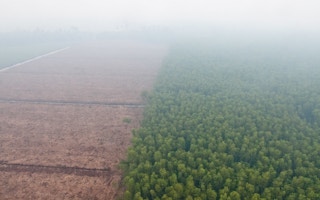Much global attention has been drawn to the Amazon Basin in Brazil, where levels of deforestation reached a new record for a single month with July fires destroying an estimated 134,500 hectares of rainforest.
However, in nearby Indonesia, around 135,747 hectares of forest land was also ablaze in the first half of 2019. For context, that is almost double the size of Singapore, with fires approaching the catastrophic levels seen in 2015. That year, Indonesian fires choked Singapore and the region in the toxic haze and released more carbon into the atmosphere than the entire European Union combined.
Fires in Brazil and Indonesia share two key startling commonalities: first, both are ravaging the largest rainforests in the world. Second, both are predominantly man-made (in Brazil, estimates put human-created fires at up to 99 per cent). Irresponsible agri-businesses and local farmers are using fire as a cheap, fast and devastatingly efficient land clearance tool - the ultimate in unsustainable practices.
To combat the fires in Indonesia and worsening haze, Perlin, a Singaporean-based blockchain development company launched the Global Ledger initiative in July to develop a coordinated regional and global response to such catastrophes.
The Global Ledger initiative combines blockchain technology and data from hardware such as nano sensors, remote sensors on satellites, autonomous drones, live camera feeds and other Internet of Things devices, and then rolls these solutions out to areas at high risk of environmental degradation.
For instance, a wide range of sensor technology can be used to monitor forests and feed data directly onto Global Ledger. Once verified using multi-factor sources (e.g. a diverse array of sensor tech) and published on Global Ledger as an open, permanent and dynamically updated source of truth, organisations and individual purchasers can cease buying goods produced from using fire to clear the land.
“
Companies looking to do more than publish glossy and sanitised annual corporate social responsibility annual reports should instead join Global Ledger to create a worldwide ecosystem for greater accountability and transparency.
Dorjee Sun, co-founder, Perlin
Authorities can also easily identify and sanction guilty companies with hard proof recorded on Global Ledger. Sanctions can include fines, cancellation of certifications, cessation of government agricultural development funding and so on. These powerful economic disincentives can have a compelling and immediate impact on how producers behave now and into the future as Global Ledger continues to keep watch.
Indonesia-based company Asia Pacific Rayon (APR), one of the world’s largest integrated viscose-rayon producers, has already deployed Perlin’s blockchain tools for its Follow Our Fibre initiative to showcase and verify its extensive sustainability work behind-the-scenes.
Timestamp and location data is now recorded at every key point of APR’s value chain, providing an unprecedented level of transparency over their operations. This allows any individual, customer or organisation to access this data from Perlin’s user-friendly phone app to verify APR’s product journey from point of origin to final product bale – ensuring none has been sourced from fire-cleared land.
Additional layers of authentication is already slated for implementation to provide an even more granular view of APR’s operations. Based on the success of Follow Our Fibre, Perlin is actively working to bring more Indonesian companies online to prove their sustainable sourcing and production, particularly in palm oil, timber, paper and pulp.
With wider industry adoption and global efforts to move reporting from voluntary to mandatory (or at a minimum, core to internal corporate social responsibility policies), Global Ledger can be used to create report cards on public commitments by companies and even countries. The relevant governance bodies and authorities can then act by dispensing the corresponding economic rewards or penalties based on measurable empirically measured outcomes.
Perlin has the direct support of the World Economic Forum, International Chamber of Commerce, the Chambers Climate Coalition, the Singapore Government’s trade authority Enterprise Singapore and a growing list of enterprises based in Southeast Asia and globally.
We at Perlin are now inviting more partners to join Global Ledger to fight man-made environmental disasters, such as the fires in Brazil and Indonesia.
Our co-founder of Perlin, Dorjee Sun, said: “We need companies to take a stand on sustainability – brands like Zara have promised 100 per cent sustainable fibers in their clothes by 2025. But who is going to monitor, verify and prove that this has been achieved? Companies looking to do more than publish glossy and sanitised annual corporate social responsibility annual reports should instead join Global Ledger to create a worldwide ecosystem for greater accountability and transparency.”
Darren Toh is a co-founder of Perlin & Head of Communications for Global Ledger based in Singapore, with over a decade as an Australian corporate regulator, federal investigator, and committed conservationist.









